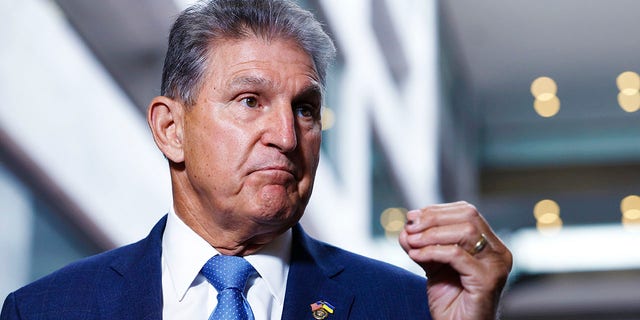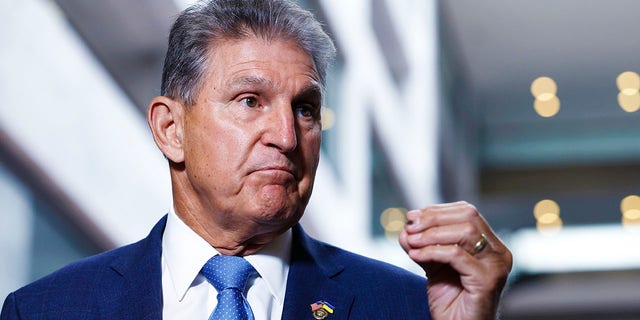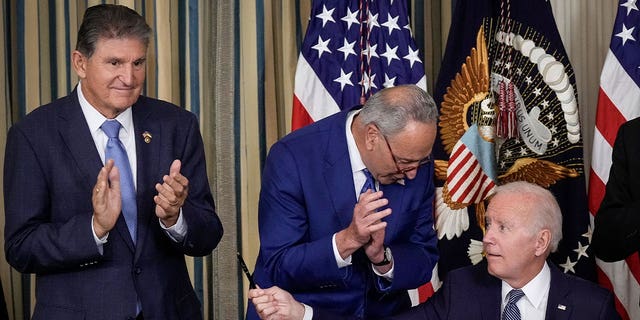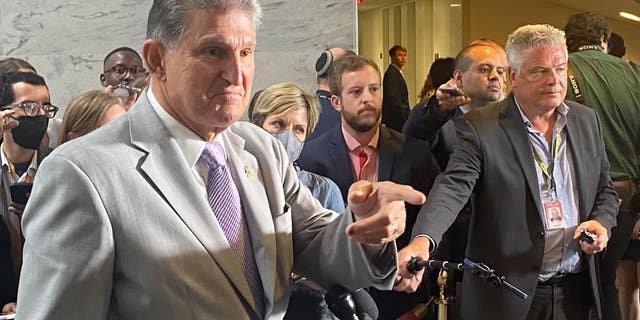
NEWYou can now listen to Fox News articles!
It’s known as “paying the fiddler.”
There are ledgers in life. Balance sheets. Rewards reaped. Penalties assessed. Fines meted out. Prices paid.
We all receive our various dues.
Such accounting logs are maintained in politics. Voters keep track. Journalists document such things. And so do politicians when it comes to the political capital of their colleagues.
Sen. Joe Manchin, D-W.V., found himself paying the fiddler this week.
Senate Republicans collected on a political lien they had against Manchin the past few days. And, Manchin may not have realized it, but liberal Democrats cashed in on a political mortgage they took out on the West Virginia Democrat in 2021.
Manchin and Senate Majority Leader Chuck Schumer, D-N.Y., shocked the political world in late July. The duo announced an accord on an elusive social spending plan.

WASHINGTON, DC – AUGUST 01: Sen. Joe Manchin (D-W.V.) gestures as he speaks to reporters in the Hart Senate Office building on August 01, 2022 in Washington, DC. Manchin, who returned to Capitol Hill after quarantining with Covid-19, spoke to reporters about the deal he reached with Senate Majority Leader Chuck Schumer (D-NY) on the Inflation Reduction Act of 2022. (Anna Moneymaker/Getty Images)
Manchin effectively torpedoed President Biden’s massive “Build Back Better” measure in December last year. That earned Manchin the ire of progressives and plaudits from Republicans. Manchin said the bill spent too much – especially at a time of skyrocketing inflation. Manchin pushed for cheaper prescription drugs and deficit reduction.
Most thought the hallmark of the Democrats’ social agenda all but evaporated. That’s why the Schumer/Manchin alert in July rocked everyone.
Within weeks, House and Senate Democrats coalesced around a much slimmer package than Build Back Better. The plan dealt with health care, the climate and included deficit reduction. Democrats christened the bill the “Inflation Reduction Act” (IRA) – even though some were dubious that the measure would ever address inflation.
SENATE SET FOR TEST VOTE ON MANCHIN ENERGY PROPOSAL AS GOVERNMENT SHUTDOWN LOOMS
But dealing with inflation brought Manchin on board. And, in a 50-50 Senate, Democrats couldn’t have approved the IRA without Manchin’s vote.
Democrats publicly embraced Manchin – for now. But privately, many progressives seethed at Manchin. They believe Manchin took advantage of them and his dithering nearly unspooled Mr. Biden’s agenda.
Bad Democratic memories about Manchin didn’t dissipate right away.
But what few knew when Manchin reached an agreement with Schumer is that they carved a separate pact. Manchin knew that the next big fight on Capitol Hill would be an interim funding bill to avert a government shutdown this fall. So Manchin extracted a promise from Schumer. In exchange for his vote for the IRA, Schumer agreed to tuck into this fall’s spending package a plan to expedite energy permitting and approve a pipeline important to Manchin.
Republicans were apoplectic that Manchin abandoned his stance and finally supported the IRA.
“You are going to be held accountable by your voters on this issue,” Sen. Lindsey Graham, R-S.C., warned Manchin in August. “You’re supposed to get some special deal for some pipelines in West Virginia on the Continuing Resolution to fund the government. I will not vote for a Continuing Resolution that is part of a political payback scheme.”

WASHINGTON, DC – AUGUST 16: U.S. President Joe Biden (R) moves to give Sen. Joe Manchin (D-W.V.) (L) the pen he used to sign The Inflation Reduction Act with Senate Majority Leader Charles Schumer (D-N.Y.) in the State Dining Room of the White House August 16, 2022, in Washington, DC. The $737 billion bill focuses on climate change, lower health care costs and creating clean energy jobs by enacting a 15% corporate minimum tax, a 1-percent fee on stock buybacks and enhancing IRS enforcement. (Drew Angerer/Getty Images)
A “Continuing Resolution,” or “CR,” is a Band-Aid spending package to avert a government shutdown.
Congress reconvened a few weeks ago with only one major “to do” item on its agenda: fund the government by September 30. But most lawmakers were in the dark about specifics of the Manchin deal. No one really knew exactly what was the agreement between Manchin and Schumer. Fox is told many Democrats doubted Manchin’s plan would remain in the bill.
“All to be discussed,” said House Appropriations Committee Chairwoman Rosa DeLauro, D-Conn., when asked about the Manchin/Schumer arrangement. “Let’s just see what happens. We’re going to keep the government open. And we will see what transpires.”
Schumer remained mum on details of the Manchin provision. But the New York Democrat was insistent that the Manchin provision would appear in the spending bill.
“Our intention is to add it to the CR,” said Schumer on September 7 when asked by reporters about the status of the Manchin language. “Absolutely.”
Environmental activists and progressive Democrats became increasingly vocal about Manchin’s permitting plan as the month progressed. Yours truly asked Schumer on September 13 if he was surprised at the outrage from the left about his pact with Manchin.
“The permitting agreement is part of the IRA agreement,” said Schumer. “I’m going to add it to the CR and it will pass.”
I followed up with Schumer on September 20th. I asked if there would be “any circumstances whatsoever” that Schumer would strip the Manchin language from the CR. I noted that Schumer vowed for “two weeks” to maintain the provision in the spending package. “
“I’ll say it for two weeks and one day,” responded Schumer.
But it was doubtful that Manchin had the votes.
Sen. Bernie Sanders, I-Vt., formally announced his opposition to the plan.
“I never expected Bernie Sanders in the far extreme left to ever be for any permitting,” said Manchin on Fox News Sunday. “What we’re dealing with and a toxic political atmosphere.”
However, other Democrats expressed their own reservations. Sen. Tim Kaine, D-Va., had a problem with how the bill would greenlight Manchin’s pet project pipeline without proper environmental reviews.
“I’m not opposed to the Mountain Valley Pipeline,” said Kaine. “I don’t think Congress should be in the business of approving pipelines or rejecting them.”
But Manchin banked on help from Republicans. Democrats said Republicans didn’t want to assist Manchin since he finally caved to support his party’s spending package.
“They don’t want to give any reward to Joe Manchin,” said Senate Majority Whip Dick Durbin, D-Ill.
Republicans seemed to relish seeing Manchin squirm.
“I just don’t know whether Joe’s going to be able to pass this thing or not,” said Sen. John Kennedy, R-La. “He’s my friend and he’s a savvy politician. You know, he made a deal without having all the ducks in a row. I’m not even sure they know where the ducks are right now.”
On Monday, Senate Minority Leader Mitch McConnell, R-Ky., invited Manchin’s fellow moderate Sen. Kyrsten Sinema, D-Ariz., to speak at the McConnell Center at the University of Louisville.
Sinema voted for the IRA in August. But McConnell complimented the Arizona Democrat for not wanting to overturn the filibuster.
“It took one hell of a lot of guts for Kyrsten Sinema to stand up and say ‘I’m not going to break the institution to achieve short-term goals,” said McConnell.
The Kentucky Republican showered Sinema with lavish praise.
“She is, in my view…the most-effective first-term senator, I’ve seen in my time in the Senate,” gushed McConnell. “A genuine moderate and a dealmaker.”
THE SPEAKER’S LOBBY: THE ‘UBER-WOKE’ SWEEPSTAKES
Back in Washington, Manchin continued to work the phones on his plan. But Manchin couldn’t cut a deal to make his deal work.
McConnell whipped GOP members against the Manchin provision, characterizing it as a “phony fig leaf.” Bipartisan senators signaled they would back the CR to avert a government shutdown this week – but only if leaders stripped Manchin’s plan from the bill. Manchin lacked 60 votes to overcome a filibuster. And late on Tuesday afternoon, Manchin relented.

Sen. Joe Manchin, D-W.Va., calls on a reporter during a press conference about Democrats’ reconciliation bill. (Tyler Olson/Fox News)
The Senate cleared a filibuster hurdle a couple of hours later with more than 70 yeas.
“I just think that when this deal was cut, about two months ago, there was never a real understanding or a plan for how the second half of this was going to get done,” said Senate Minority Whip John Thune, R-S.D. “And I think Joe found that out today.”
For more than a year-and-a-half, Republicans got what they wanted: Manchin’s opposition to Build Back Better. Manchin frustrated his Democratic colleagues during that same period. Then, in late July, Manchin secured what he wanted: a svelte version of the Democrats’ social spending package. And Democrats got some of what they wanted.
CLICK HERE TO GET THE FOX NEWS APP
But Manchin wanted two more things: streamlined permitting and the Mountain Valley Pipeline.
Liberal Democrats didn’t want that. And they didn’t need Manchin after they approved the IRA.
This is known as paying the fiddler.
There are balance sheets. Bills come due. Prices paid.
A surprisingly simple equation on Capitol Hill.







